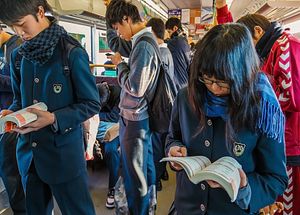Ever since 1982, when the content of Japan’s government-censored textbooks first became an international issue, Japan’s Ministry of Education, Culture, and Technology (MEXT) has been no stranger to diplomatic controversy. Today’s impending storm, heralded by MEXT’s requirement that textbooks reflect the government position on history and territorial issues, is just another episode of the same old headache in Japan’s regional diplomacy.
Specifically, all textbooks approved in the latest round of the government’s screening process promote Japan’s claims on the disputed Senkaku/Diaoyu Islands (controlled by Japan, disputed with China) and Takeshima/Dokdo Islands (controlled by and disputed with South Korea). MEXT justifies these changes as necessary to counter similar attempts by the South Korean education system.
Other changes include six out of seven textbooks toning down criticism of the military’s involvement in mass suicides among Okinawans in 1945, and only one textbook addressing the subject of comfort women.
As Northeast Asia braces for another round of educational cat-and-mouse (with South Korea’s Ministry of Education already pledging to increase coverage of the Dokdo and comfort women issues in their textbooks), it appears that both Japan and South Korea have lost sight of their long-term interests.
Both governments, trapped by domestic interest groups that feel emotional satisfaction in pressing their claims, are making the issue worse and even more intractable for future policymakers. Neither side can back down – by cooling down their heated narratives or ignoring the other’s transgressions – in this tit-for-tat retaliatory game, where moral stature and diplomatic “face” are at stake. Unfortunately, there is no easy prescription for Japanese and South Korean politicians’ inability to resist nationalist pressures.
Since ultimately the decision of whether or not to adopt a government-approved textbook is made by local school boards, school boards — and local citizens — used to have some influence. For example, when Tsukurukai’s controversial textbooks were approved by MEXT in 2001 and 2005, the textbooks captured less than 1 percent of the market. Fushosha (the publisher) eventually disowned Tsukurukai textbooks because they were financially unsustainable. This was a victory for citizen activists, who worked to convinced local school boards to not adopt the textbooks. However, because of the uniformity imposed by the most recent round of screenings, local school boards’ right to choose will not mean so much, and are unlikely lead to any major changes this time around.
Another factor that allows MEXT to make such aggressive changes is the weakening of the teachers’ unions. Teachers’ unions, which have more left-leaning political tendencies, used to act as a break on overreach by the central government, but they are slowly losing their influence.
Neither does the Japanese textbook market provide any answers, as private textbook publishers must comply with government requests or risk losing the approval required to sell textbooks to local school boards. With a declining fertility rate already shrinking the existing market for textbooks, a decision to go against the government could impose an impossibly heavy toll on the publisher.
It is hard, even for an optimist, to find positive signs in these recent developments. One can only hope that the ripples do not extend beyond South Korea and China, and that the impact on bilateral relations will be relatively superficial.
































